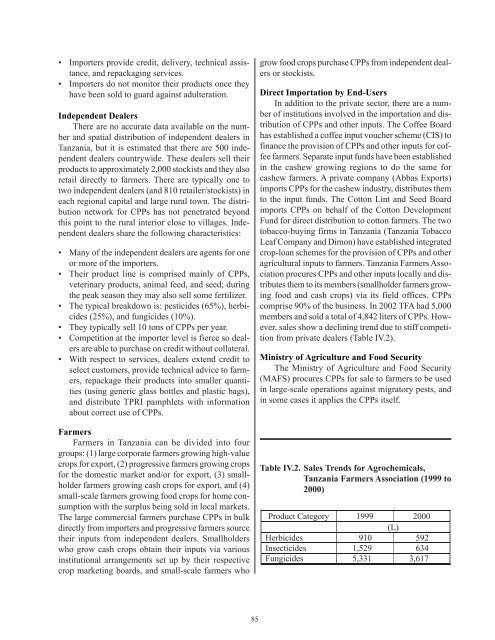An Action Plan for Developing Agricultural Input Markets in Tanzania
An Action Plan for Developing Agricultural Input Markets in Tanzania
An Action Plan for Developing Agricultural Input Markets in Tanzania
You also want an ePaper? Increase the reach of your titles
YUMPU automatically turns print PDFs into web optimized ePapers that Google loves.
• Importers provide credit, delivery, technical assistance,<br />
and repackag<strong>in</strong>g services.<br />
• Importers do not monitor their products once they<br />
have been sold to guard aga<strong>in</strong>st adulteration.<br />
Independent Dealers<br />
There are no accurate data available on the number<br />
and spatial distribution of <strong>in</strong>dependent dealers <strong>in</strong><br />
<strong>Tanzania</strong>, but it is estimated that there are 500 <strong>in</strong>dependent<br />
dealers countrywide. These dealers sell their<br />
products to approximately 2,000 stockists and they also<br />
retail directly to farmers. There are typically one to<br />
two <strong>in</strong>dependent dealers (and 810 retailer/stockists) <strong>in</strong><br />
each regional capital and large rural town. The distribution<br />
network <strong>for</strong> CPPs has not penetrated beyond<br />
this po<strong>in</strong>t to the rural <strong>in</strong>terior close to villages. Independent<br />
dealers share the follow<strong>in</strong>g characteristics:<br />
• Many of the <strong>in</strong>dependent dealers are agents <strong>for</strong> one<br />
or more of the importers.<br />
• Their product l<strong>in</strong>e is comprised ma<strong>in</strong>ly of CPPs,<br />
veter<strong>in</strong>ary products, animal feed, and seed; dur<strong>in</strong>g<br />
the peak season they may also sell some fertilizer.<br />
• The typical breakdown is: pesticides (65%), herbicides<br />
(25%), and fungicides (10%).<br />
• They typically sell 10 tons of CPPs per year.<br />
• Competition at the importer level is fierce so dealers<br />
are able to purchase on credit without collateral.<br />
• With respect to services, dealers extend credit to<br />
select customers, provide technical advice to farmers,<br />
repackage their products <strong>in</strong>to smaller quantities<br />
(us<strong>in</strong>g generic glass bottles and plastic bags),<br />
and distribute TPRI pamphlets with <strong>in</strong><strong>for</strong>mation<br />
about correct use of CPPs.<br />
Farmers<br />
Farmers <strong>in</strong> <strong>Tanzania</strong> can be divided <strong>in</strong>to four<br />
groups: (1) large corporate farmers grow<strong>in</strong>g high-value<br />
crops <strong>for</strong> export, (2) progressive farmers grow<strong>in</strong>g crops<br />
<strong>for</strong> the domestic market and/or <strong>for</strong> export, (3) smallholder<br />
farmers grow<strong>in</strong>g cash crops <strong>for</strong> export, and (4)<br />
small-scale farmers grow<strong>in</strong>g food crops <strong>for</strong> home consumption<br />
with the surplus be<strong>in</strong>g sold <strong>in</strong> local markets.<br />
The large commercial farmers purchase CPPs <strong>in</strong> bulk<br />
directly from importers and progressive farmers source<br />
their <strong>in</strong>puts from <strong>in</strong>dependent dealers. Smallholders<br />
who grow cash crops obta<strong>in</strong> their <strong>in</strong>puts via various<br />
<strong>in</strong>stitutional arrangements set up by their respective<br />
crop market<strong>in</strong>g boards, and small-scale farmers who<br />
85<br />
grow food crops purchase CPPs from <strong>in</strong>dependent dealers<br />
or stockists.<br />
Direct Importation by End-Users<br />
In addition to the private sector, there are a number<br />
of <strong>in</strong>stitutions <strong>in</strong>volved <strong>in</strong> the importation and distribution<br />
of CPPs and other <strong>in</strong>puts. The Coffee Board<br />
has established a coffee <strong>in</strong>put voucher scheme (CIS) to<br />
f<strong>in</strong>ance the provision of CPPs and other <strong>in</strong>puts <strong>for</strong> coffee<br />
farmers. Separate <strong>in</strong>put funds have been established<br />
<strong>in</strong> the cashew grow<strong>in</strong>g regions to do the same <strong>for</strong><br />
cashew farmers. A private company (Abbas Exports)<br />
imports CPPs <strong>for</strong> the cashew <strong>in</strong>dustry, distributes them<br />
to the <strong>in</strong>put funds. The Cotton L<strong>in</strong>t and Seed Board<br />
imports CPPs on behalf of the Cotton Development<br />
Fund <strong>for</strong> direct distribution to cotton farmers. The two<br />
tobacco-buy<strong>in</strong>g firms <strong>in</strong> <strong>Tanzania</strong> (<strong>Tanzania</strong> Tobacco<br />
Leaf Company and Dimon) have established <strong>in</strong>tegrated<br />
crop-loan schemes <strong>for</strong> the provision of CPPs and other<br />
agricultural <strong>in</strong>puts to farmers. <strong>Tanzania</strong> Farmers Association<br />
procures CPPs and other <strong>in</strong>puts locally and distributes<br />
them to its members (smallholder farmers grow<strong>in</strong>g<br />
food and cash crops) via its field offices. CPPs<br />
comprise 90% of the bus<strong>in</strong>ess. In 2002 TFA had 5,000<br />
members and sold a total of 4,842 liters of CPPs. However,<br />
sales show a decl<strong>in</strong><strong>in</strong>g trend due to stiff competition<br />
from private dealers (Table IV.2).<br />
M<strong>in</strong>istry of Agriculture and Food Security<br />
The M<strong>in</strong>istry of Agriculture and Food Security<br />
(MAFS) procures CPPs <strong>for</strong> sale to farmers to be used<br />
<strong>in</strong> large-scale operations aga<strong>in</strong>st migratory pests, and<br />
<strong>in</strong> some cases it applies the CPPs itself.<br />
Table IV.2. Sales Trends <strong>for</strong> Agrochemicals,<br />
<strong>Tanzania</strong> Farmers Association (1999 to<br />
2000)

















